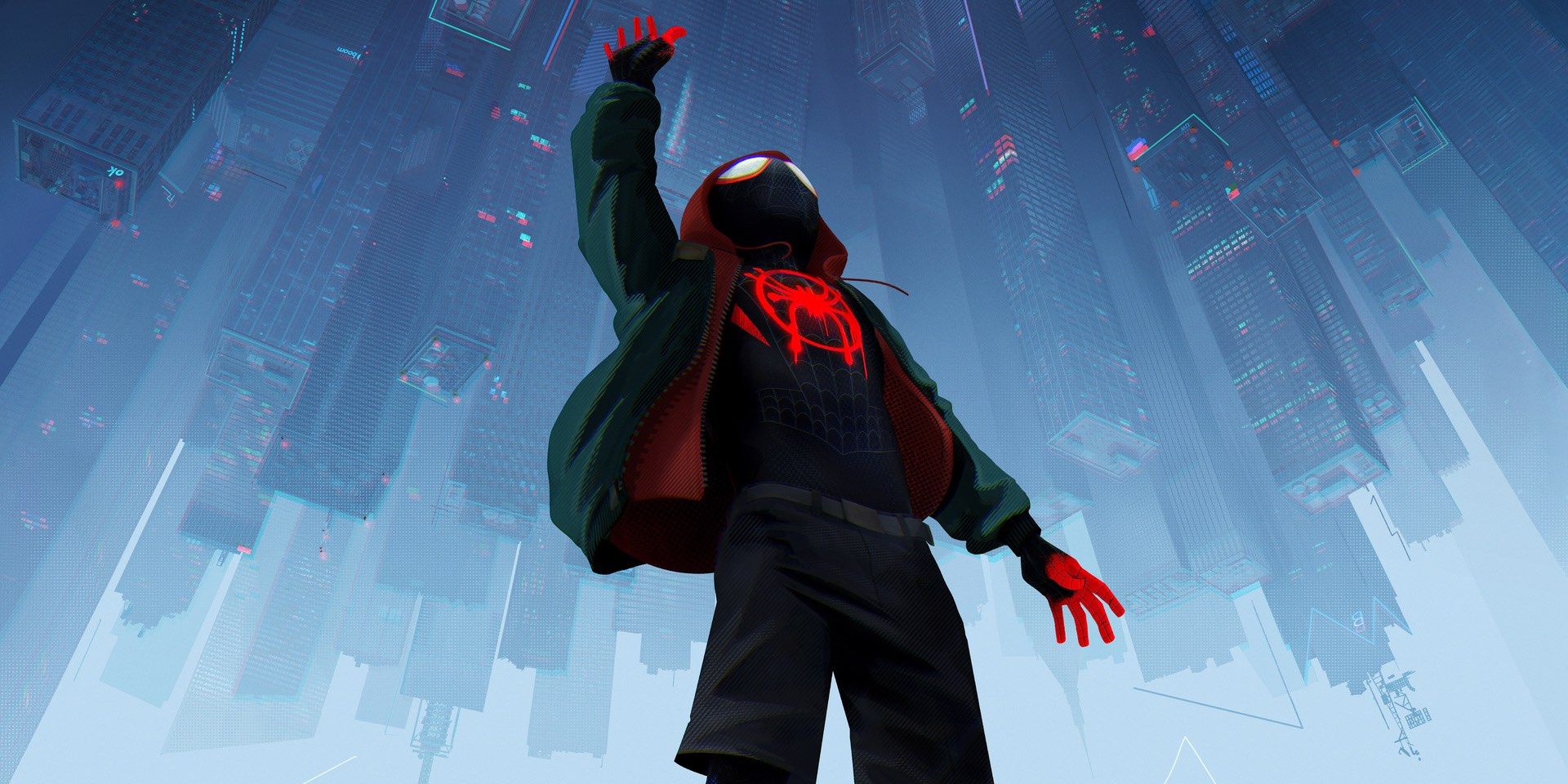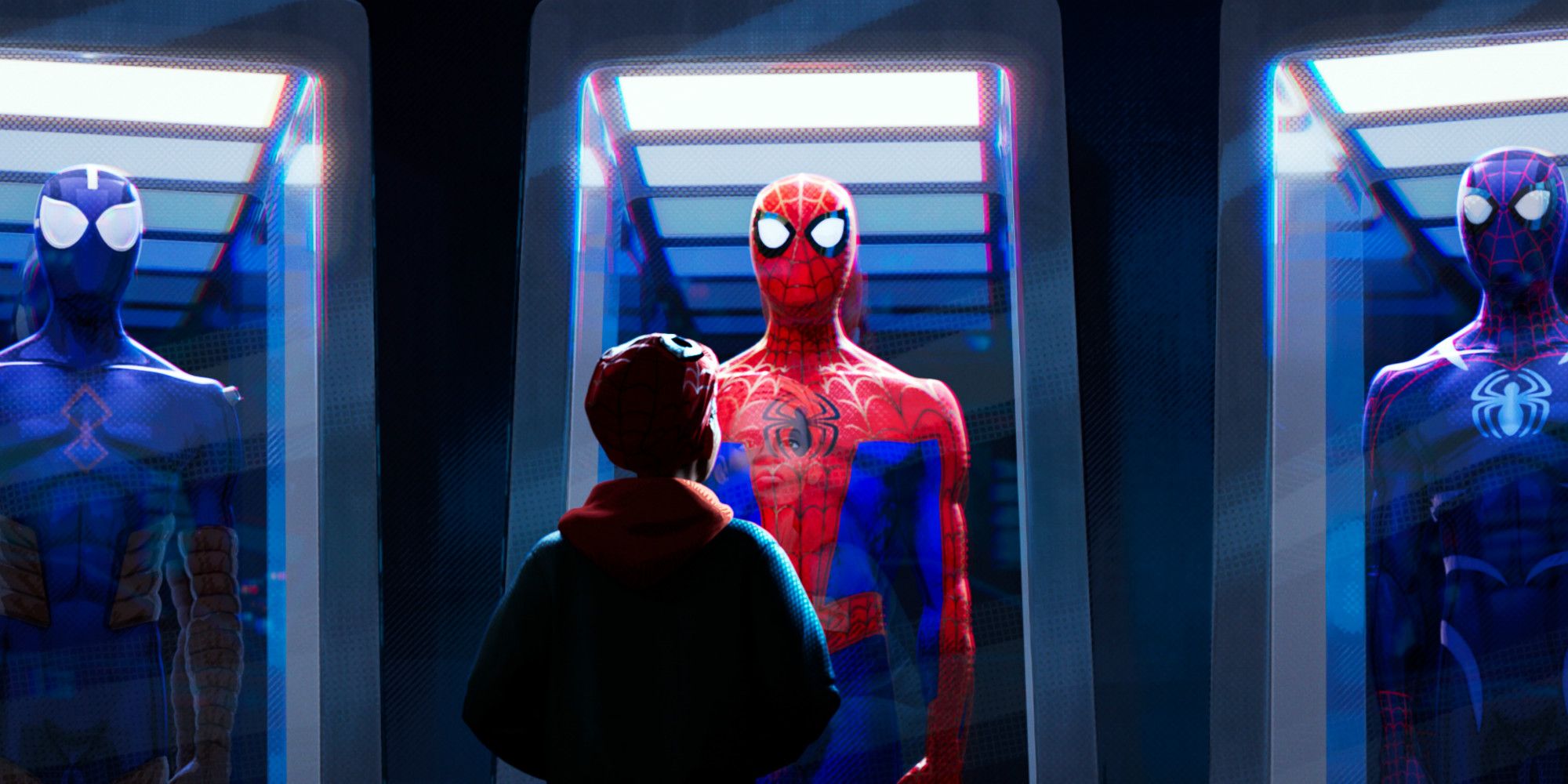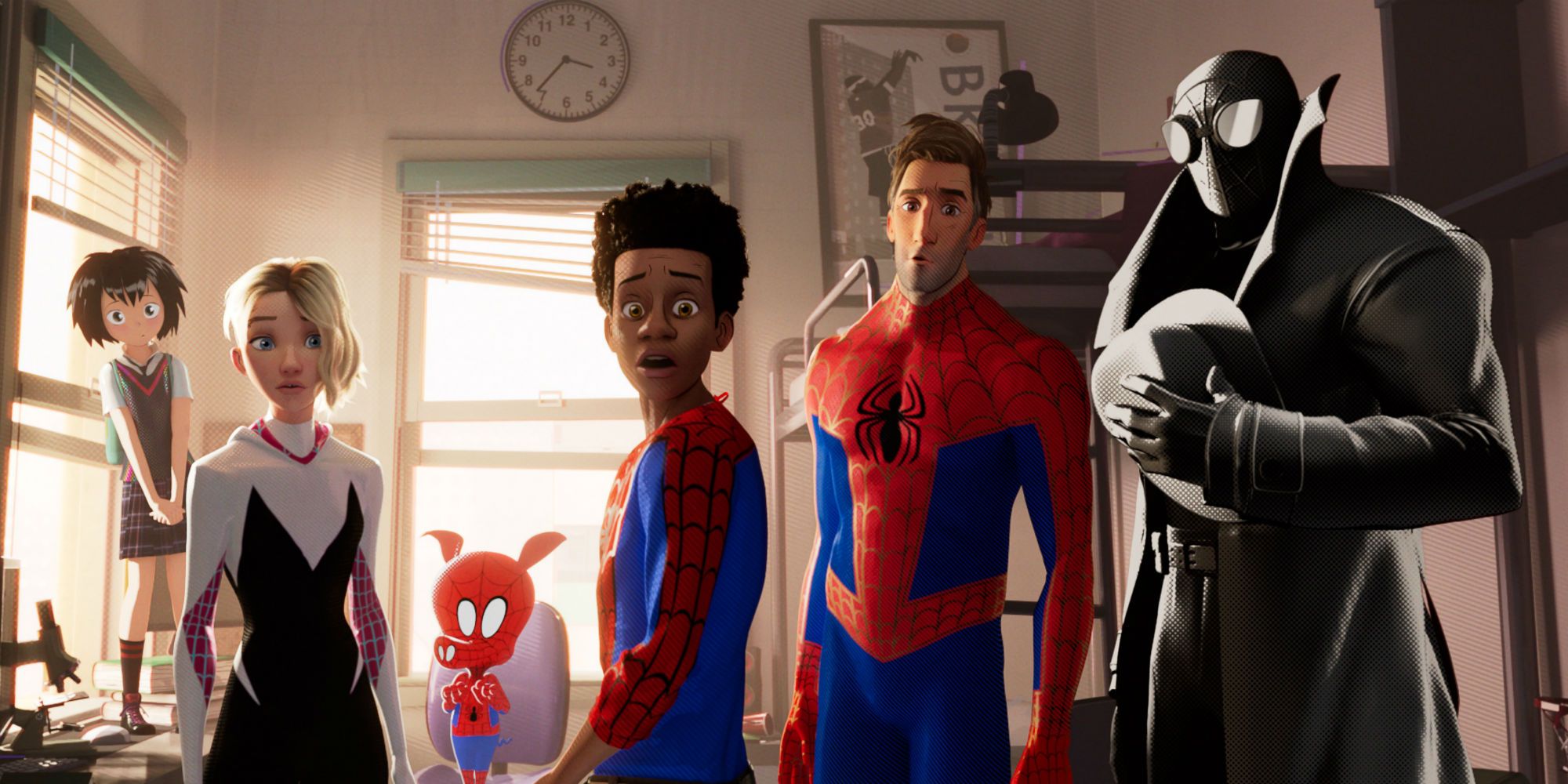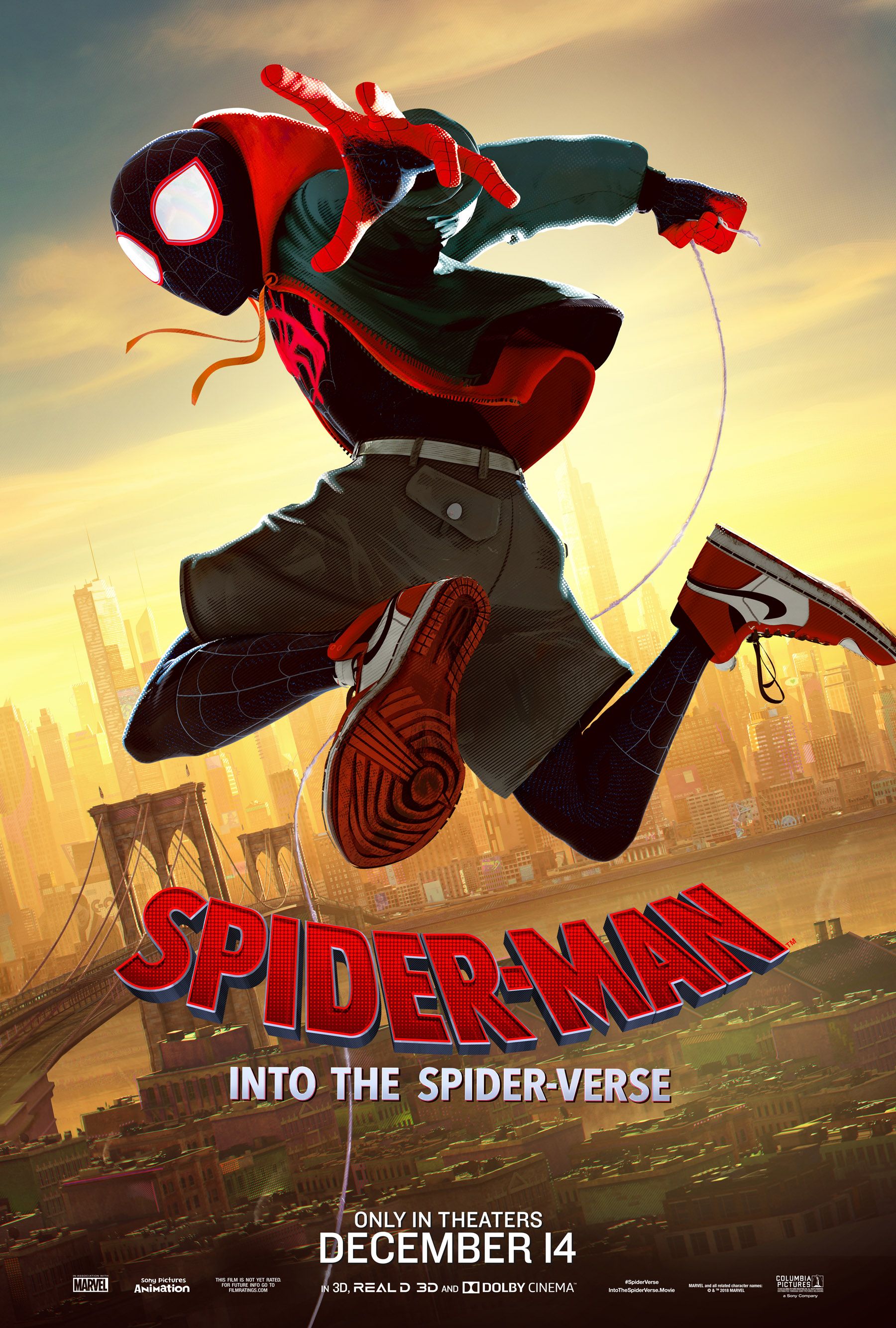Spider-Man: Into the Spider-Verse delivers a funny, heartwarming and fresh superhero origin story with gorgeously executed comic-style animation.
Over the last two decades, Hollywood has produced three different live-action iterations of the classic Spider-Man character with Peter Parker under the webslinger's mask. However, Sony Pictures Animation focuses on a different webhead for Spider-Man: Into the Spider-Verse, introducing the first big screen adaptation of Brian Michael Bendis and Sara Pichelli's Miles Morales, while also paying respects not only to Peter Parker but the various other comic book versions of Spider-Man. The half-black, half-latino Miles Morales made his debut in the Marvel comics in 2011 and fans have since hoped to see him join - or lead - a live-action superhero movie; instead, he first graces the big screen in Sony Animation's web-slinging adventure. Spider-Man: Into the Spider-Verse delivers a funny, heartwarming and fresh superhero origin story with gorgeously executed comic-style animation.
Spider-Man: Into the Spider-Verse introduces viewers to Miles Morales (Shameik Moore), a Brooklyn teenager - the son of Jefferson Davis (Brian Tyree Henry) and Rio Morales (Luna Lauren Velez) - who has recently switched to the competitive Visions Academy. However, it's clear that Miles is struggling to find his place not only at Visions, but within his family as well, sneaking out of school to hang out with his uncle Aaron Davis (Mahershala Ali). It's on one of these ventures outside of school that Miles and Aaron tag a tunnel off the NYC subway and Miles is bitten by a radioactive spider. In true Spider-Man origin story form, Miles begins to demonstrate the powers of the webhead and they make his school life even more difficult, causing an awkward incident with a new student.
Then, Miles stumbles upon his universe's version of Spider-Man, who's attempting to stop Kingpin (Liev Schreiber) from using the supercollider he built under Brooklyn because it could open a black hole. Miles promises Spider-Man he'll destroy Kingpin's supercollider and save the multiverse. However, when it becomes clear that Spider-People from other dimensions within the Spider-Verse have wound up on Miles' Earth - including Peter B. Parker (Jake Johnson), Gwen Stacy (Hailee Steinfeld), Spider-Man Noir (Nicolas Cage), Spider-Ham (John Mulaney) and Peni Parker (Kimiko Glenn) - Miles will need to send them home before shutting down the supercollider. But, considering how recently Miles acquired his powers, it remains to be seen if he's ready to take on Kingpin. Miles will have to learn to control his powers and decide what kind of hero he wants to be if he's to become Spider-Man and save the Spider-Verse.
Spider-Man: Into the Spider-Verse was directed by The Little Prince writer Bob Persichetti, Peter Ramsey (Rise of the Guardians) and 22 Jump Street writer Rodney Rothman from a script by Rothman and Phil Lord, the latter of which also served as a producer alongside his longtime collaborator Christopher Miller (21 Jump Street, The LEGO Movie). Into the Spider-Verse provides a fresh new spin on the typical superhero origin story, especially the Spider-Man origin; not only because Miles is an inherently different character than Peter Parker, but because of the introduction of the multiverse. Spider-Man is a comic book character with an especially long legacy both in print and film/television; Into the Spider-Verse sees Miles wrestling with how he fits into this multiverse full of Spider-People in much the same way as the movie must wrestle with how it fits into the Spider-Man legacy. Thankfully, both Miles and Into the Spider-Verse demonstrate a unique style and a great deal of heart, qualities that undoubtedly set this superhero and his origin movie apart from other Spider-People/Spider-Man stories.
One of the more unique aspects of Into the Spider-Verse, though, is the movie's animation style. In addition to the 3D animation typical of Sony projects, Into the Spider-Verse also employs multiple comic book styles and textures. From the text boxes used to show Miles' thoughts after he's granted super-powers to the various techniques used to render each of the Spider-People from other dimensions, the movie carefully crafts every layer of the animation. For instance, Spider-Ham is rendered like a 3D version of the classic Looney Tunes, while Spider-Man Noir is completely in 2D black and white and Peni Parker is drawn in an anime style. This variety of style offers Into the Spider-Verse a depth and texture that animated movies rarely, if ever before possessed. The animation also particularly shines in showcasing many of the film's action scenes, bringing to life certain battles that could never be realized in live-action. Altogether, the effect of the excellently executed animation is that Into the Spider-Verse truly feels like a comic book come to life, which provides for a wholly fresh and unique movie experience.
Of course, all the animation is meant to highlight the story of Miles Morales, and Moore provides a compelling voice performance as the young man who transforms from an unsure teenager to the self-assured superhero known as Spider-Man. Moore is also supported by an exceptionally talented voice cast, including Henry as Miles' tough, but loving father and Ali as Miles' uncle Aaron - a character comic fans will know is key to Miles' origin story. Moore, Henry and Ali ground Into the Spider-Verse with their familial dynamic and heart, which contrasts well with the largely humorous turns of Cage, Mulaney and Glenn. The performances of these three help to bring Spider-Man Noir, Spider-Ham and Peni to life in the movie, while mostly offering comedic relief. Bridging the gap between heart and humor are Johnson's Peter Parker, who plays the reluctant mentor well and brings the actor's typical charm to this past-his-prime superhero. Steinfeld isn't given much to work with as Gwen Stacy, but she does have some moments of heart with Moore's Miles that pave the way for a deeper story in the future. Lastly, Into the Spider-Verse features a surprise actor in the role of Miles' world's Peter Parker, who contrasts well with Johnson's own take on the character.
Spider-Man: Into the Spider-Verse does retread the same ground as other big-screen superhero origin stories, so many of which have hit theaters over the last two decades that viewers may have grown tired of them. Certainly, Into the Spider-Verse hits many of the same typical beats of these superhero origins, but the movie does bring enough new ideas to the table to differentiate itself. This is a Spider-Man movie that's aware viewers have seen Peter Parker's origin story told time and time again in print, animation and live-action - Into the Spider-Verse even employs a recurring joke that taps into the theme of telling and retelling the same story in a different light. As such, Into the Spider-Verse is a Spider-Man movie not only for fans of Miles Morales, but of the Spider-Man mantle and its legacy. It's also, no doubt, a movie that will entertain even casual fans of Spider-Man or superhero stories.
Ultimately, Spider-Man: Into the Spider-Verse offers nearly two-hours of stunning and altogether captivating animation that's beautifully rendered to bring the superhero origin story of Miles Morales - and the Spider-Verse - to life in a never-before-seen manner. Although the threads left hanging for a potential sequel may be somewhat more fascinating than the fairly by-the-numbers origin story of Miles, the multiverse does provide a unique twist on Miles' coming-of-age hero tale from awkward teenager to self-confident superhero. Still, at the end of the day, Into the Spider-Verse is Miles' story and his first big-screen starring turn will undoubtedly leave viewers wanting more from this Spider-Man. So it's a good thing Spider-Man: Into the Spider-Verse sets up a sequel.
Trailer
Spider-Man: Into the Spider-Verse is now playing in U.S. theaters nationwide. It is 116 minutes long and is rated PG for frenetic sequences of animated action violence, thematic elements, and mild language.
Let us know what you thought of the film in the comments section!





